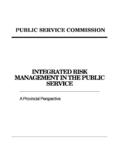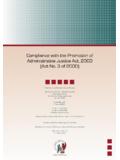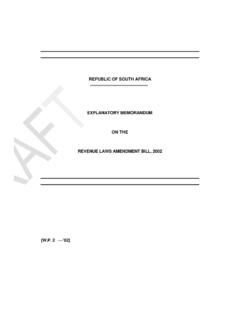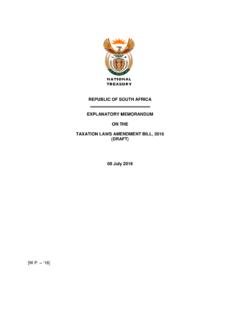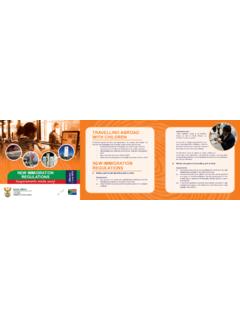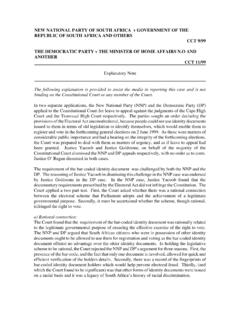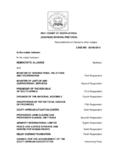Transcription of EXPLANATORY MANUAL ON THE CODE OF CONDUCT FOR …
1 EXPLANATORY MANUAL ON THE code OF CONDUCT FOR THE PUBLIC SERVICEA PRACTICAL GUIDE TO ETHICAL DILEMMAS IN THE WORKPLACEI ssued by: Public Service CommissionPrivate Bag X121 Pretoria00011 2002 Public Service Commission First edition, first impression This work is copyright. No part of his publication may be reproduced in any form or by any means mechanical or electronic, without prior written permission from the Public Service Commission. Requests and inquiries concerning reproduction rights should be directed to the Public Service Commission, Commission House, cnr Hamilton and Ziervogel Streets, Arcadia 0083. Any inquiries regarding this publication should be directed to: Directorate: Professional Ethics Promotion Public Service Commission Private Bag X121 Pretoria, 0001 Telephone (+27-12) 325-1123 Fax (+27-12) 321-3348 Printed and bound by Tirommoho Communications 2 VALUES AND PRINCIPLES THE TOP TEN FOR PUBLIC SERVICE IN south africa The Constitution of south africa (Chapter 10) requires that the Public Service be.
2 Governed by the democratic values and principles of the Constitution; maintaining and promoting a high standard of professional ethics; promoting efficient, economic and effective use of resources; orientated towards development; delivering services impartially, fairly, equitably and without bias; responding to people s needs and encouraging public participation in policy matters; accountable for its actions; transparent by providing the public with timely, accessible and accurate information; cultivating good human resource management and career development practices to maximize human potential; broadly representative of the south African people, with employment and personnel management practices based on ability, objectivity, fairness, and the need to redress the imbalances of the past.
3 3 CONTENTS 1. 2. 3. EXPLANATORY MANUAL ON THE code OF CONDUCT FOR THE PUBLIC Responsibility of the employer and 4. GUIDELINES ON THE PROVISIONS OF THE Relationship with the Legislature and the Relationship with the Relationships among Performance of Personal CONDUCT and private 5. code OF CONDUCT FOR THE PUBLIC SERVICE (ANNEXURE A)..56 4 1. FOREWORD The Public Service Commission is mandated in terms of the Constitution, 1996, to promote and maintain a high standard of professional ethics throughout the Public Service. In 1997 the code of CONDUCT for the Public Service was promulgated and was subsequently promoted through workshops with officials at both national and provincial level.
4 It was also necessary to develop a practical guide on the code of CONDUCT to generate a better understanding of its implications and application. On behalf of the Public Service Commission, I am honoured to present to all the officials employed in the Public Service of south africa this EXPLANATORY MANUAL on the code of CONDUCT for the Public Service. The code of CONDUCT is an important pillar in the establishment of good governance and ethical CONDUCT of public servants. It also raises such issues as respect for human rights, the rule of law, accountability, transparency in government, personal CONDUCT and private interests. The Public Service Commission appeals to all public servants, from the most junior to the most senior, to demonstrate a practical understanding of procedures, directions and instructions contained in the code of CONDUCT .
5 This is not only possible but mandatory if effective service delivery is to reach our citizens. It is crucial also that officials should as a rule reject, resist and refuse offers and gifts as these may be construed as bribes. We wish to commend all managers and officials who are engaged in promoting the code of CONDUCT for the Public Service. I urge you to keep up the good work and never give 5 up the challenge of promoting an ethos of professionalism in the Public Service. The Public Service Commission hopes this EXPLANATORY MANUAL will be a useful guide in the promotion of honesty and integrity in the workplace and inspire even greater efforts from all of us to achieve a culture of zero tolerance of corruption in south africa .
6 Finally, I would urge all public servants to ensure that their CONDUCT conforms with the basic values and principles governing public administration and that they acquaint themselves with the code of CONDUCT and this EXPLANATORY MANUAL . Prof. SS Sangweni Chairperson: Public Service Commission 6 2. ACKNOWLEDGEMENTS The process of developing this EXPLANATORY MANUAL on the code of CONDUCT for the Public Service could hardly have taken place without the dedication and support of a number of individuals and organizations who deserve special mention and recognition: National and Provincial departments have supported the development of the EXPLANATORY MANUAL and subsequently provided valuable inputs for further improvements; The Office of the Public Protector contributed to the development of this document with critical inputs.
7 Employee organizations and labour unions took part in numerous meetings and workshops and made valuable suggestions; The Staff of the Office of the Public Service Commission assisted in the process of researching and drafting the final document; Finally, we are grateful to the British Department for International Development for funding the printing of this EXPLANATORY MANUAL on the code of CONDUCT for the Public Service. 7 3. EXPLANATORY MANUAL ON THE code OF CONDUCT FOR THE PUBLIC SERVICE INTRODUCTION The purpose of this MANUAL is to explain the contents of the code of CONDUCT more fully. The phrasing of the official code required brevity, precision and official terminology.
8 This MANUAL is aimed at making the code more understandable to all public servants. The MANUAL does not introduce any new principles and follows the same structure and numbering of the principles as in the code , to allow for easy comparison. When using this MANUAL , departments should try to add examples of their own, related to their particular environment. It should be emphasised that the development of this MANUAL is a dynamic process and that it may require revision from time to time, like the code itself. TRAINING In order to promote a high standard of professional ethics in the workplace, public servants should be encouraged to think and behave ethically.
9 This MANUAL should therefore serve as an aid in developing and presenting short training 8 courses for all employees. This MANUAL also contains many examples which illustrate ethical complexities in the work environment, which may serve as a basis for training and case studies. As a companion to the code , this MANUAL can assist in maintaining public confidence in the integrity and impartiality of the Public Service by providing minimum expectations about acceptable behaviour and benchmarks for ethical practices. RESPONSIBILITY OF THE EMPLOYER AND EMPLOYEES It is an accepted fact that human beings learn by observation and experience.
10 A special responsibility is therefore placed on the employer, namely the executing authorities (Ministers and MEC s) at the political level, and Public Service managers at all levels, to create an appropriate environment in which values are established and exemplary models are set for all employees. Section 195(1) (a) of the Constitution requires that a high standard of professional ethics must be promoted and maintained in public administration generally. In terms of the collective agreement (Public Service Co-ordinating Bargaining Council Resolution 2 of 1999) 9 all the employees in the Public Service have the responsibility to comply with the prescribed code of CONDUCT .




